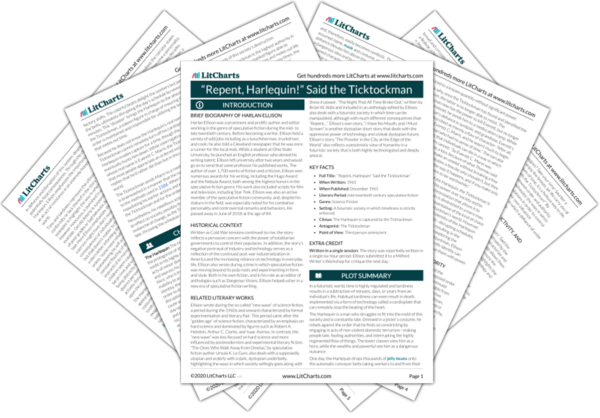Brief Biography of Harlan Ellison
Harlan Ellison was a prominent and prolific author and editor working in the genre of speculative fiction during the mid- to late twentieth century. Before becoming a writer, Ellison held a variety of odd jobs including as a tuna fisherman, truckdriver, and cook; he also told a Cleveland newspaper that he was once a runner for the local mob. While a student at Ohio State University, he punched an English professor who denied his writing talent; Ellison left university after two years and would go on to send that same professor his published works. The author of over 1,700 works of fiction and criticism, Ellison won numerous awards for his writing, including the Hugo Award and the Nebula Award, both among the highest honors in the speculative fiction genre. His work also included scripts for film and television, including Star Trek. Ellison was also an active member of the speculative fiction community, and, despite his stature in the field, was especially noted for his combative personality and controversial remarks and behaviors. He passed away in June of 2018 at the age of 84.
Historical Context of “Repent, Harlequin!” Said the Ticktockman
Written as Cold War tensions continued to rise, the story reflects a pervasive concern with the power of totalitarian governments to control their populaces. In addition, the story’s negative portrayal of industry and technology serves as a reflection of the continued post-war industrialization in America and the increasing reliance on technology in everyday life. Ellison also wrote during a time in which speculative fiction was moving beyond its pulp roots and experimenting in form and style. Both in his own fiction, and in his role as an editor of anthologies such as Dangerous Visions, Ellison helped usher in a new era of speculative fiction writing.
Other Books Related to “Repent, Harlequin!” Said the Ticktockman
Ellison wrote during the so-called “new wave” of science fiction, a period during the 1960s and onward characterized by formal experimentation and literary flair. This period came after the “golden age” of science fiction, characterized by an emphasis on hard science and dominated by figures such as Robert A. Heinlein, Arthur C. Clarke, and Isaac Asimov. In contrast, the “new wave” was less focused on hard science and more influenced by postmodernism and experimental literary fiction. “The Ones Who Walk Away from Omelas,” by speculative fiction author Ursula K. Le Guin, also deals with a supposedly utopian and orderly with a dark, dystopian underbelly, highlighting the ways in which society willingly goes along with those in power. “The Night That All Time Broke Out,” written by Brian W. Aldis and included in an anthology edited by Ellison, also deals with a futuristic society in which time can be manipulated, although with much different consequences than “Repent…” Ellison’s own story, “I Have No Mouth, and I Must Scream” is another dystopian short story that deals with the oppressive power of technology and a bleak dystopian future. Ellison’s story “The Prowler in the City at the Edge of the World” also reflects a pessimistic view of humanity in a futuristic society that is both highly technologized and deeply amoral.
Key Facts about “Repent, Harlequin!” Said the Ticktockman
-
Full Title: “‘Repent, Harlequin!’ Said the Ticktockman”
-
When Written: 1965
-
When Published: December 1965
-
Literary Period: mid-twentieth century speculative fiction
-
Genre: Science Fiction
-
Setting: A futuristic society in which timeliness is strictly enforced
-
Climax: The Harlequin is captured by the Ticktockman
-
Antagonist: The Ticktockman
-
Point of View: Third person omniscient
Extra Credit for “Repent, Harlequin!” Said the Ticktockman
